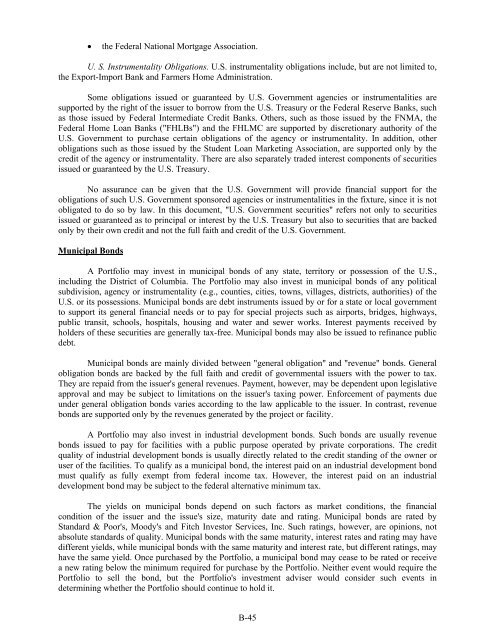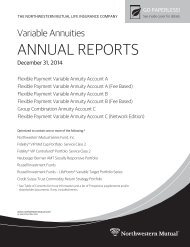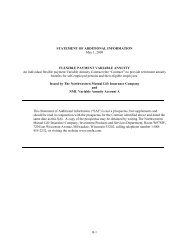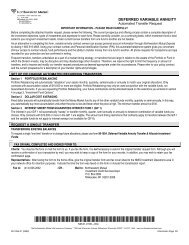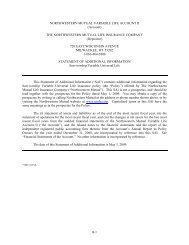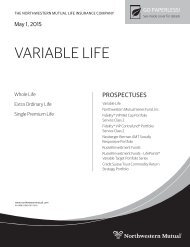B-1 STATEMENT OF ADDITIONAL INFORMATION Dated May 1 ...
B-1 STATEMENT OF ADDITIONAL INFORMATION Dated May 1 ...
B-1 STATEMENT OF ADDITIONAL INFORMATION Dated May 1 ...
You also want an ePaper? Increase the reach of your titles
YUMPU automatically turns print PDFs into web optimized ePapers that Google loves.
• the Federal National Mortgage Association.U. S. Instrumentality Obligations. U.S. instrumentality obligations include, but are not limited to,the Export-Import Bank and Farmers Home Administration.Some obligations issued or guaranteed by U.S. Government agencies or instrumentalities aresupported by the right of the issuer to borrow from the U.S. Treasury or the Federal Reserve Banks, suchas those issued by Federal Intermediate Credit Banks. Others, such as those issued by the FNMA, theFederal Home Loan Banks ("FHLBs") and the FHLMC are supported by discretionary authority of theU.S. Government to purchase certain obligations of the agency or instrumentality. In addition, otherobligations such as those issued by the Student Loan Marketing Association, are supported only by thecredit of the agency or instrumentality. There are also separately traded interest components of securitiesissued or guaranteed by the U.S. Treasury.No assurance can be given that the U.S. Government will provide financial support for theobligations of such U.S. Government sponsored agencies or instrumentalities in the fixture, since it is notobligated to do so by law. In this document, "U.S. Government securities" refers not only to securitiesissued or guaranteed as to principal or interest by the U.S. Treasury but also to securities that are backedonly by their own credit and not the full faith and credit of the U.S. Government.Municipal BondsA Portfolio may invest in municipal bonds of any state, territory or possession of the U.S.,including the District of Columbia. The Portfolio may also invest in municipal bonds of any politicalsubdivision, agency or instrumentality (e.g., counties, cities, towns, villages, districts, authorities) of theU.S. or its possessions. Municipal bonds are debt instruments issued by or for a state or local governmentto support its general financial needs or to pay for special projects such as airports, bridges, highways,public transit, schools, hospitals, housing and water and sewer works. Interest payments received byholders of these securities are generally tax-free. Municipal bonds may also be issued to refinance publicdebt.Municipal bonds are mainly divided between "general obligation" and "revenue" bonds. Generalobligation bonds are backed by the full faith and credit of governmental issuers with the power to tax.They are repaid from the issuer's general revenues. Payment, however, may be dependent upon legislativeapproval and may be subject to limitations on the issuer's taxing power. Enforcement of payments dueunder general obligation bonds varies according to the law applicable to the issuer. In contrast, revenuebonds are supported only by the revenues generated by the project or facility.A Portfolio may also invest in industrial development bonds. Such bonds are usually revenuebonds issued to pay for facilities with a public purpose operated by private corporations. The creditquality of industrial development bonds is usually directly related to the credit standing of the owner oruser of the facilities. To qualify as a municipal bond, the interest paid on an industrial development bondmust qualify as fully exempt from federal income tax. However, the interest paid on an industrialdevelopment bond may be subject to the federal alternative minimum tax.The yields on municipal bonds depend on such factors as market conditions, the financialcondition of the issuer and the issue's size, maturity date and rating. Municipal bonds are rated byStandard & Poor's, Moody's and Fitch Investor Services, Inc. Such ratings, however, are opinions, notabsolute standards of quality. Municipal bonds with the same maturity, interest rates and rating may havedifferent yields, while municipal bonds with the same maturity and interest rate, but different ratings, mayhave the same yield. Once purchased by the Portfolio, a municipal bond may cease to be rated or receivea new rating below the minimum required for purchase by the Portfolio. Neither event would require thePortfolio to sell the bond, but the Portfolio's investment adviser would consider such events indetermining whether the Portfolio should continue to hold it.B-45


